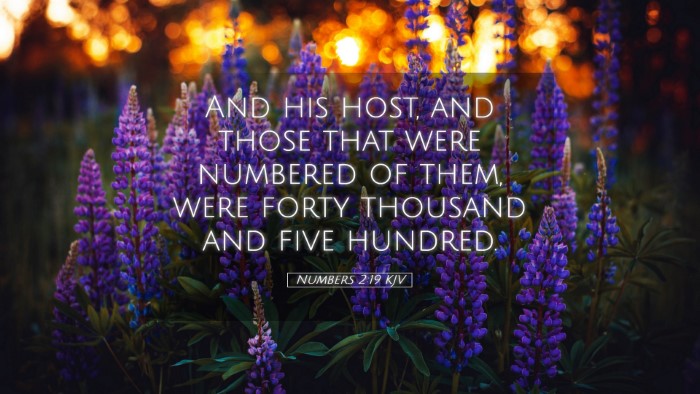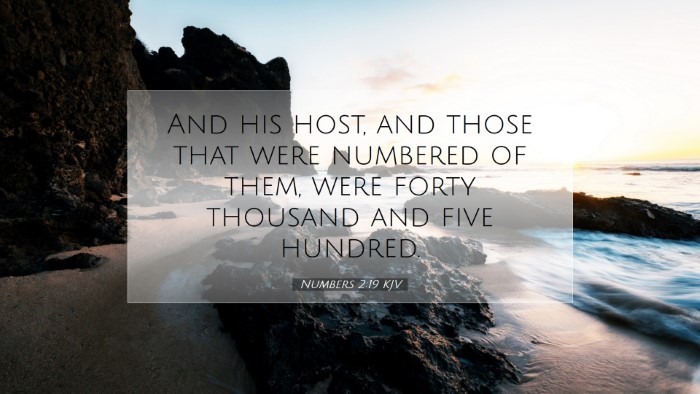Commentary on Numbers 2:19
Numbers 2:19 states: "And his host, and those that were numbered of them, were forty and six thousand and five hundred." This verse provides a quantitative insight into the organization of the Israelites during their journey through the wilderness. It is significant both in terms of military preparedness and spiritual symbolism.
Overview of the Context
The book of Numbers details the Israelites' journey from Sinai towards the Promised Land. Chapter 2 focuses on the arrangement of the tribes around the Tabernacle. Each tribe had its designated place, underscoring the order and structure established by God as they traveled in the wilderness.
Technical Analysis
Matthew Henry highlights that the number mentioned indicates the strength and capability of the tribe of Judah, one of the most prominent tribes in Israel. This verse illustrates the importance of organization and the notion that God’s people are to be structured and prepared.
Numerical Significance
Albert Barnes expounds on the number 46,500, suggesting that such specific numbering signifies completeness within God's plan. The mention of numbers in this context not only serves a logistical purpose but also reinforces a sense of identity among the Israelites—each number represents not just men but families, stories, and God's chosen people.
Historical Insight
According to Adam Clarke, the structure of the army reflects the nations' need for preparedness in facing the challenges of the wilderness. Clarke emphasizes that while these numbers seem to convey military readiness, they are ultimately under the divine providence and guidance of God. Clarke interprets the military list not as a means to glorify war, but as a necessary step in the fulfillment of God's covenantal promise to the patriarchs.
Spiritual Implications
The assembly of these tribes in a systematic manner speaks volumes about the necessity of order in worship and community. Just as the Israelites were called to gather in a specific configuration, so too are modern believers invited to fall into a unity of purpose and mission.
The Role of Leadership
Henry points to the importance of leadership as exemplified through the organization of the tribes. Moses, as the appointed leader, serves as a model of faithful stewardship, demonstrating how godly leadership creates a framework for communal strength. This notion resonates with pastors and church leaders today, encouraging them to establish a clear vision and structure within their own congregations.
Unity and Diversity
Numbers 2:19 highlights the diversity within the unified community of Israel. Each tribe, while unique in its characteristics and strengths, contributes to the overall mission. This principle can be likened to the body of Christ, where various members have different roles yet important contributions to make. The distinct number of 46,500 indicates that God has a plan and purpose for each individual within the larger community.
Application for Contemporary Believers
For pastors, students, and theologians, this verse serves as a reminder of the ongoing need for organization in ministry. As the church journeys through cultural and societal changes, there is a call to structure, prepare, and create a community that honors God together.
Covenantal Perspective
Barnes notes the significance of membership within what can be viewed as a covenant community. Each person counts, and each number represents a soul precious to God. The statistic in Numbers 2:19 transcends mere military enumeration; it speaks to God's deep concern and attention for His people.
Conclusion
In summary, Numbers 2:19 reflects both a practical organization for the Israelite camp and a deeper spiritual truth regarding the nature of God's covenant with His people. It serves to remind contemporary believers of God's ongoing work through His structured communities, inviting them to be counted among those who serve Him faithfully.


